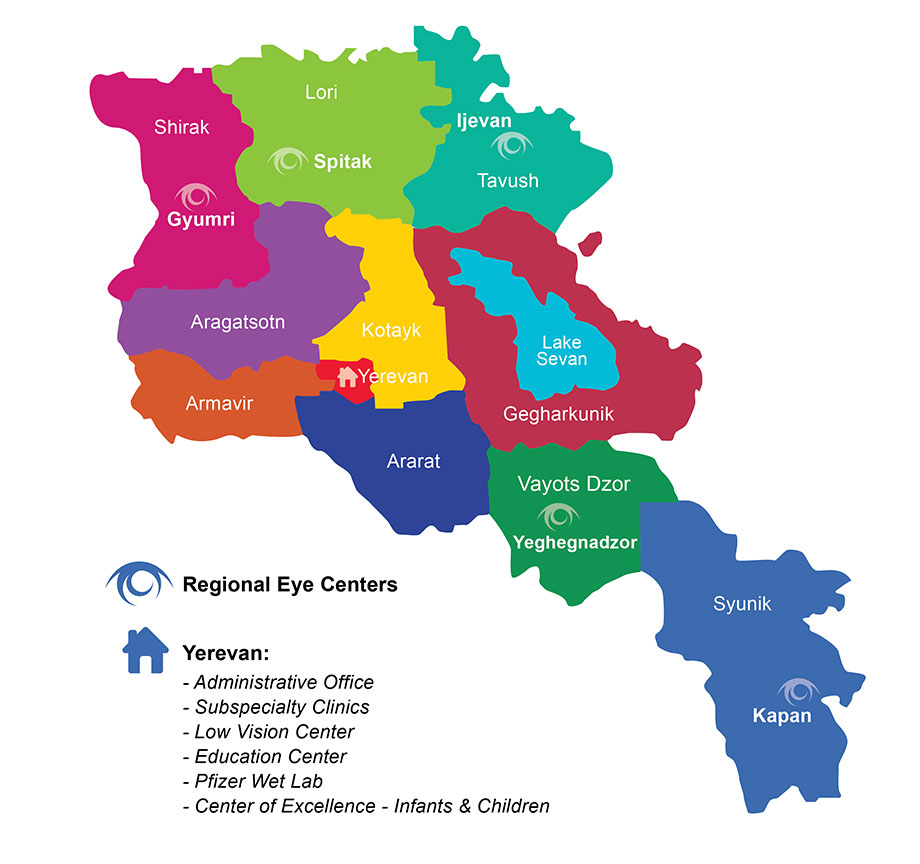The Low Vision Center
AECP Low Vision Center First and Only One in Caucuses
The EyeCare Project Low Vision Center opens a new world for the visually impaired — the only low vision center in the Caucuses. Low vision is a loss of eyesight that makes everyday tasks difficult. A person with low vision may find it difficult or impossible to accomplish activities such as reading, writing, shopping, watching television, driving a car or recognizing faces. When vision cannot be improved with regular eyeglasses, medication or surgery, people with low vision need help to learn how to make the most of their remaining sight and maintain their independence. People with low vision have some useful vision, which can often be improved with low vision aids. Losing vision does not mean giving up your activities, but it does mean finding new ways of doing them.
In many developed countries computer technology has already removed numerous obstacles to education and employment for visually impaired individuals. As well, they are able to discover life by reading books transcribed into Braille—a system that enables blind and partially sighted people to read and write through touch.
In 2005, the Armenian EyeCare Project opened its Low Vision Clinic—the first and only low vision clinic in the Caucuses. Director, Dr. Lilit Mkrtchyan, did a low vision fellowship in the United States at the Lighthouse Foundation, a leading worldwide center on vision impairment and vision rehabilitation at the University of Florida.
Low Vision is loss of sight that cannot be corrected by ordinary eyeglasses, contact lenses, medication or surgery. A person with low vision should not be confused with blindness.
Low vision can result from a variety of diseases, disorders, and injuries that affect the eye. Many people with low vision have age-related macular degeneration, cataract, glaucoma, or diabetic retinopathy. Age-related macular degeneration accounts for almost 45 percent of all cases of low vision. About 135 million people around the world have low vision.
EyeCare Project Program
The Computer Training Program (CTP) is the first initiative of the Armenian EyeCare Project that addresses the need for vocational and life skills training for people with visual impairments. “We believe that this training opportunity will help to raise the self-esteem and confidence of individuals with visual impairments and at the same equip them with the skills necessary to find employment in the future,” said Nune Yeghiazaryan, AECP Country Director. Delivered by a qualified professional teacher from the school for visually impaired children, the two-month training covers a wide range of subjects from processing and data entry to the use of the Internet and more.
“For people with visual impairments, the possibility of using a computer is a big step forward in obtaining access to information, learning new skills, gaining computer literacy and increasing their independence,” said Lilit Mkrtchyan, Low Vision Center Director. According to Dr. Mkrtchyan, in addition to the CTP for adults, children from School No.14 for the Visually Impaired have had the opportunity to participate in specialized Low Vision training classes. The goal of the training program is to help children with visual impairments to preserve their remaining vision and to get oriented with unfamiliar situations with the help of a walking stick. All of these efforts are aimed at providing visually impaired adults and children with the highest possible level of independence.
For individuals in Armenia with visual impairments the AECP Training Program offers a unique opportunity to develop their professional skills, increase their access to various print resources and spend their leisure time in a meaningful and useful way. “I hope that the AECP Program will continue to provide opportunities for more people with visual impairments to participate and learn new skills. I have many non-sighted friends and friends with low vision who can really benefit from this training,” said one of the participants.






